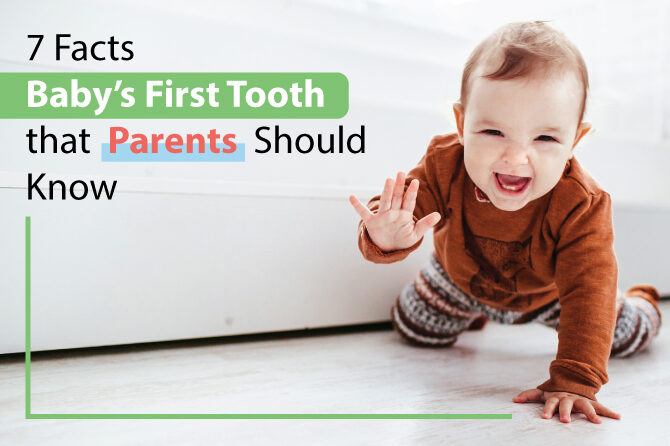
7 Facts of Baby’s First Tooth that Parents Should Know
The baby’s first tooth is the one that grows in your little one’s mouth. If you’ve been following along with your baby’s development, you probably know that milk teeth care are very important for healthy teeth and oral health. But what exactly is a milk tooth? And why do they matter so much? Keep reading! We’re going to give you the answers.
What is the first tooth?
The first tooth is called a milk tooth. It’s an incisor that cuts and grinds food as you chew it. This temporary tooth falls out in about six months when your permanent teeth come in, so you don’t need to worry about it anymore! The first and second teeth are called milk teething because they usually appear around six months, although some children may have them sooner or later than others.
When should your baby start eating solid foods?
The best time to start your baby on solid foods is between 6 and 8 months, but it’s important to remember that the timing will vary depending on your child’s needs. Some babies may be ready sooner than others, and some may need more time before introducing solids.
7 Facts parents should know
Milk teeth are the first set of teeth that come in. They start as milk teeth, then become deciduous, which means they shed or fall out before erupting into permanent adult teeth. Here are seven factors parents should know:
- Timing: Most babies get their first tooth between the ages of 6 and 10 months, but some may start teething as early as three months or as late as 14 months
- Order: The two bottom front teeth are usually the first to come in, followed by the top front teeth
- Teething symptoms: Teething symptoms can include drooling, biting, and crankiness. Some babies may also have a low-grade fever and swollen gums
- Pain relief: To relieve teething pain, parents can offer a cold, wet cloth for the baby to chew on or give them toys to bite. Teething gels or creams can also provide relief or prevent milk tooth decay
- Brushing: Once a baby gets their first tooth, it’s important to start brushing it. A small, soft-bristled toothbrush and a tiny amount of toothpaste can be used
- Dental visits: Babies should see a dentist by their first birthday or within six months after the first tooth appears. It allows for early detection and prevention of any milk tooth decay
- Diet: A healthy diet is vital for a baby’s developing teeth. Offer your baby a variety of nutrient-rich foods and limit sugary drinks and snacks. Also, avoid putting your baby to bed with a bottle, as this can increase the risk of cavities
Parents need to take care of their baby’s teeth from the beginning, as this sets the foundation for a lifetime of good oral health.
How do you take care of babies first tooth?
While your baby is still in the womb, you can’t see or touch him. That’s why it’s so vital that you take care of everything he needs during this time. One of the most important things you can do is ensure his teeth are healthy and clean! The first or milk tooth will appear when your infant’s fourth, fifth, and sixth teeth are still covered by the gums, though they can differ. Some children will show up sooner than others (the 4-6 week mark) and some later (the 7-9 week mark).
Call to Action
When your baby is born, you first notice their sweet little smile. Then there’s that cute little button nose, those soft cheeks, and round eyes. But the little one may have something to show off: their teeth! It’s not just about how cute they look but also about helping them grow properly as soon as possible so they can start chewing on solid food soon. So why are we talking about this? Because it’s a good idea for all parents to get a good dentist in mind before bringing home their new bundle of joy.
If you have questions about what should be done before taking your baby home or even afterward, please don’t hesitate to contact Kids Dental Studio anytime! Kids Dental Studio is a dental studio created specifically for kids. The clinic is kid-friendly, and there are several games for kids to play in the waiting room. The clinic’s operatory room, which includes two dental chairs and is well-stocked with modern dental supplies and tools, allows for children’s speedy and comfortable dental care. Our goals are to provide a pleasant dental experience, uphold the standard of dental care, and foster a favorable attitude towards dental care so that subsequent dental appointments will also be pleasurable. Keeping these factors in mind, we planned and designed the dental studio and ensured that the children would benefit from our services.
Leave a reply